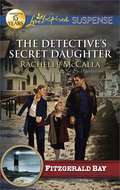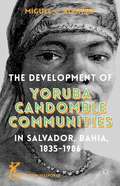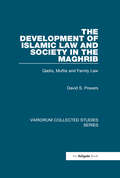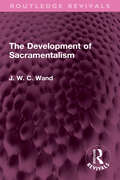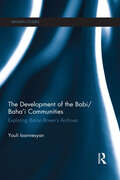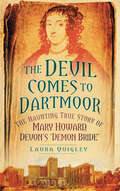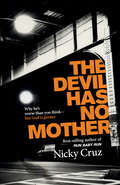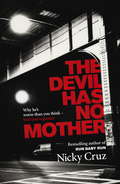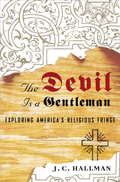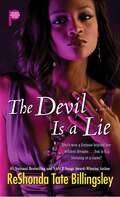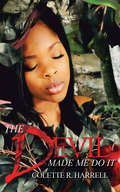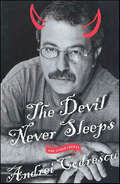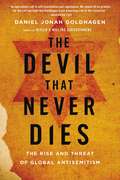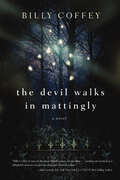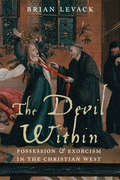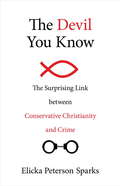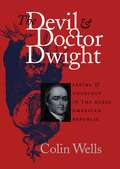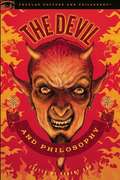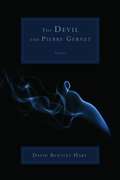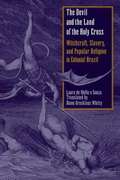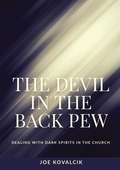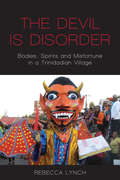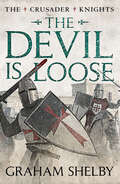- Table View
- List View
The Detective's Secret Daughter
by Rachelle MccallaIt's been ten years since Victoria Evans left Owen Fitzgerald and Fitzgerald Bay behind. Now she's returned, looking for a safe place for herself and her nine-year-old daughter. A daughter who bears a striking resemblance to Owen. Why would Victoria keep their child a secret? Owen wants answers, but has to focus on the murder that's rocked Fitzgerald Bay. And when Victoria is threatened, he's determined to solve the case-and keep mother and child safe.Because Owen won't lose them all over again.
The Development Of Yoruba Candomble Communities In Salvador, Bahia, 1835–1986
by Miguel C. AlonsoThis project is an attempt to bring together the many fragments of history concerning the Yoruba religious community and their rise to prominence in Salvador, Bahia, Brazil, from the mid-nineteenth to the late-twentieth centuries.
The Development of Islamic Law and Society in the Maghrib: Qadis, Muftis and Family Law
by David S. PowersThe first eleven essays in this collection treat the application of Islamic law in qadi courts in the Maghrib in the period between 1100 and 1500 CE. Based on preserved legal documents and the expert opinions of Muslim jurists (Muftis), the essays examine family law cases involving legal minority, guardianship, divorce, inheritance, bequests, and endowments. Cumulatively, the cases bear witness to the effectiveness and efficiency of the Islamic judicial system in this period. Contrary to popular perceptions, the cases demonstrate that Muslim jurists placed a high value on reasoned thought and were sensitive to the manner in which law, society, and culture interacted with, and shaped, each other. The final essay shows how the treatment of family endowments by colonial regimes in Algeria and India at the end of the 19th and beginning of the 20th centuries shaped, or misshaped the modern western scholarly understanding of Islamic law.
The Development of Sacramentalism (Routledge Revivals)
by J. W. WandFirst published in 1928, The Development of Sacramentalism traces the history of the fundamental presuppositions upon which the doctrine of sacraments is built from primitive religions, through the Old Testament and the Mystery Cults. This book will be of interest to students of history and religion.
The Development of the Babi/Baha'i Communities: Exploring Baron Rosen's Archives (Iranian Studies)
by Youli IoannesyanBaron Rosen’s Babi/Baha’i archives presents private letters and diplomatic correspondence from the nineteenth century, preserved among the prominent Russian scholar Baron Victor Rosen’s materials in the Archive of the Russian Academy of Sciences, St. Petersburg branch. The materials cast light on the first studies of the Babi and Baha’i Faiths, new religious phenomena which, in Baron Rosen’s time, were emerging in Persia. Iran has always been a strategic concern of Russia’s geopolitical interests and the traditional importance which has been given to Persia has manifested itself in hundreds of documents and writings collected by the pre-revolutionary Russian diplomats and scholars. These documents, large parts of which have never been published before, reveal new information on the attitude of the Russian government towards religious and ethnic minorities as well as towards related issues within the Russian Empire and abroad. Bringing together materials in Russian, English, Persian, Arabic and French related to the Babi and Baha’i Faiths from Rosen’s archive in the original languages with an English translation, this book will be of great interest to students and researchers in the fields of Iranian Studies, Religion and Middle East Studies amongst others.
The Devil Comes to Dartmoor: The Amazing True Story of Mary Howard, Devon's 'Demon Bride'
by Laura QuigleyMany will have heard of the ghostly white lady haunting Tavistock – the notorious Mary Howard, accused of murdering her four husbands. A few may know the true story of her lover, George Cutteford, a Plymouth 'cutty man' who became a Puritan lawyer. Cutteford was imprisoned in the horror of Lydford Gaol, persecuted by Mary's fourth husband - Sir Richard Grenville, the most notorious and sadistic royalist General of the Civil War. But fewer still will know the secrets George Cutteford died to protect - secrets that would destroy his own family; end Grenville’s career in shame; and make a boy with no name the richest landowner in Devon. Gathered from the varying historical accounts, and including primary material unearthed, hundreds of years ago, in an old fish market in London, comes this haunting true story of love, treachery and revenge in seventeenth-century Devon.
The Devil Has No Mother: Why He's Worse Than You Think- But God is Greater
by Nicky CruzFrom his experience of a spiritualist childhood in Puerto Rico and gang culture in New York to an international Christian ministry, Nicky Cruz has seen humanity at its best and its worst. Cruz draws on his experiences and evangelistic ministry to expound the reality of the devil's attempts to gain power over individuals and communities.
The Devil Has No Mother: Why he's Worse than You Think - but God is Greater
by Nicky CruzWith millions of copies sold, RUN BABY RUN is one of the most powerful true stories of our day: the tale of one man, a legend among gang leaders in New York, and how he turned his back on that world of tribal warfare, sex, drugs and murder for the sake of Christ. In this new book Nicky Cruz explores how the devil uses every possible means to prevent people turning to God, drawing on a wealth of examples ranging from his own spiritualist childhood to his experiences of meeting prisoners in the highest security jails in the world. But the best news is that while the devil may be everywhere, God is there too - and it's God whose power will triumph. This is a tough book to read, but it's worth it, because you'll come away convinced not just of the devil's wiles, but much more convinced of God's superior firepower. The devil's worse than you think - but God is greater.
The Devil Is a Gentleman
by J. C. HallmanA hundred years ago, the writer and philosopher William James wrote The Varieties of Religious Experience, a seminal work that has inspired generations of scholars and eccentrics alike. James’s book argues that the religious spirit in man is best understood through the study of its most extreme forms. Varieties was a watershed effort: a bestselling portrait of history’s pluralism and a defense of the spiritual quest, in all its guises, against the era’s increasingly secular sentiments. Today, with all the old tensions between skeptics and believers still in place, J. C. Hallman pays homage to James’s exploration of offbeat religious movements. But where James relied on the testimony and biographies of prophets and mystics, Hallman travels directly to some of America’s newest and most unusual religions, trekking from Druid circles in the mossy hills of northern California to the gleaming mother church of Scientology, from lurid satanic cellars in undisclosed locations to a professional-wrestling ministry in the fundamentalist heart of Texas. Along the way, he participates in a variety of rites and reports on a broad spectrum of beliefs. Eventually Hallman adopts James as his patron saint, spiritual adviser, and intellectual companion on the journey that will culminate in the creation of this book, a compelling combination of adventure and biography, spotted with hair-raising predicaments and rife with poignant portraits of unforgettable characters, including William James himself. The Devil Is a Gentlemanmaps the spiritual contours of modern American pluralism and examines the life and legacy of one of its most profound architects. From the Hardcover edition.
The Devil Is a Lie
by ReShonda Tate BillingsleyAll that glitters isn&’t gold in this new compelling tale of love, money, and divorce gone wrong from award-winning and #1 Essence bestselling author ReShonda Tate Billingsley.Most people think that money is the key to happiness, but when an ecstatic Nina Lawson wins millions in the Powerball lottery, her world only becomes more chaotic and stressful. At first, she and her fiancé, Rick, are delighted with the unexpected windfall and immediately begin planning their future. Soon, family members and friends begin coming out of the woodwork to claim a piece of Nina&’s winnings. But the most unexpected request comes from Todd, Nina&’s ex-husband. He and his fiancée, Pam (with whom he had the affair that ended their marriage) reveal that the paperwork making Todd and Nina&’s divorce official was never filed—and she may be compelled to share half the money with her husband. As the situation begins to spiral out of control, Nina risks losing her heart and her newfound winnings to find out what really matters. With just the right blend of joy, drama, and humor, Billingsley entertains and inspires readers with every turn of the page—it&’s no surprise that her readership grows with each new book.
The Devil Made Me Do It
by Colette R. HarrellThe voluptuous Esther Wiley has always known that she is special. She's a tiara-wearing, wand-carrying kind of Cinderella princess in disguise. The problem that her very own Fairy Godmother, the Prophetess Mother Reed, struggles with is getting her to live like it. Briggs Stokes is the reluctant heir to his father's worldwide, multimillion-dollar televangelist ministry, yet he yearns to be his own man. His past mistakes have caused him a private life of hurt and loneliness. Esther and Briggs meet and develop a deep soul connection, until tragedy strikes and the two are thrust apart. Their separation leads each down a different path scattered with emotional minefields. While each step they take brings them closer to who they were always meant to be, the devil is on assignment. He sends in reinforcements to usher in confusion and create chaos, and soon no one is safe. The members of Love Zion church reel from the rumors, innuendo, and downright sabotage that is going on around them. When others devise evil schemes to seek the destruction of Esther and Briggs through jealousy, greed, and murder, only divine intervention can save them. As an all-out battle for dominion breaks out in the heavens, will Esther and Briggs become a casualty of war?
The Devil Never Sleeps: And Other Essays
by Andrei CodrescuThe Devil is alive and well and living in America, Andrei Codrescu tells us, and with good reason. Nowhere else in the world--not even in Codrescu's native Transylvania--is he taken quite as seriously. When Codrescu gently derided the fundamentalist Christian belief in Rapture ("a pre-apocalyptic event during which all true believers would be suctioned off to heaven in a single woosh") in one of his commentaries on National Public, NPR received forty thousand letters in a protest spearheaded by Ralph Reed of the Christian Coalition. Codrescu was warned to "stay away from eschatology."Thankfully for us, he hasn't. In The Devil Never Sleeps, one of America's shrewdest social critics sets out to uncover the Devil's most modern and insidiously banal incarnations. Once easily recognizable by his horns, tail, and propensity for plague, today's Devil has become embedded in every fiber of our culture. Discussing everything from rock 'n' roll to William Burroughs to New Orleans bars to the Demon of Prosperity, Codrescu mockingly unmasks Old Nick as the opportunistic technocrat he really is. Embracing cell phones, cable access, and cyberspace, the ubiquitous Devil of secular culture embodies the true evil facing us today--banality.In a world teeming with distractions, we are still more than capable of being bored to death. Tormented as much by insomnia and its ravages as the Devil (perhaps they are one and the same), we've become as twenty-four-hour society, swinging desperately between tedium and terror and sleeping fitfully, if at all. As Codrescu points out, the Devil never sleeps because we just won't let him.With his characteristic charm and playful exuberance, Andrei Codrescu has successfully teased the Devil out from the darkest recesses and comic excesses of the human experience. The Devil Never Sleeps is his most wonderfully perverse book yet.
The Devil That Never Dies: The Rise and Threat of Global Antisemitism
by Daniel Jonah GoldhagenA groundbreaking--and terrifying--examination of the widespread resurgence of antisemitism in the 21st century, by the prize-winning and #1 internationally bestselling author of Hitler's Willing Executioners.Antisemitism never went away, but since the turn of the century it has multiplied beyond what anyone would have predicted. It is openly spread by intellectuals, politicians and religious leaders in Europe, Asia, the Arab world, America and Africa and supported by hundreds of millions more. Indeed, today antisemitism is stronger than any time since the Holocaust. In THE DEVIL THAT NEVER DIES, Daniel Jonah Goldhagen reveals the unprecedented, global form of this age-old hatred; its strategic use by states; its powerful appeal to individuals and groups; and how technology has fueled the flames that had been smoldering prior to the millennium. A remarkable work of intellectual brilliance, moral stature, and urgent alarm, THE DEVIL THAT NEVER DIES is destined to be one of the most provocative and talked-about books of the year.
The Devil Walks in Mattingly: A Novel
by Billy CoffeyFor the three people tortured by their secret complicity in a young man's untimely death, redemption is what they most long for . . . and the last thing they expect to receive.It has been twenty years since Philip McBride's body was found along the riverbank in the dark woods known as Happy Hollow. His death was ruled a suicide. But three people have carried the truth ever since—Philip didn't kill himself that day. He was murdered.Each of the three have wilted in the shadow of their sins. Jake Barnett is Mattingly's sheriff, where he spends his days polishing the fragile shell of the man he pretends to be. His wife, Kate, has convinced herself the good she does for the poor will someday wash the blood from her hands. And high in the mountains, Taylor Hathcock lives in seclusion and fear, fueled by madness and hatred.Yet what cannot be laid to rest is bound to rise again. Philip McBride has haunted Jake's dreams for weeks, warning that he is coming back for them all. When Taylor finds mysterious footprints leading from the Hollow, he believes his redemption has come. His actions will plunge the quiet town of Mattingly into darkness. These three will be drawn together for a final confrontation between life and death . . . between truth and lies."Coffey has a profound sense of Southern spirituality. His narrative moves the reader from . . . [a] false heaven to a terrible hell, then back again to a glorious grace." —Publishers Weekly"The Devil Walks in Mattingly . . . recalls Flannery O'Conner with its glimpses of the grotesque and supernatural." —BookPage
The Devil Within: Possession & Exorcism in the Christian West
by Brian LevackA fascinating, wide-ranging survey of the history of demon possession and exorcism through the ages.In the sixteenth and seventeenth centuries, the era of the Reformation, thousands of Europeans were thought to be possessed by demons. In response to their horrifying symptoms—violent convulsions, displays of preternatural strength, vomiting of foreign objects, displaying contempt for sacred objects, and others—exorcists were summoned to expel the evil spirits from victims&’ bodies. This compelling book focuses on possession and exorcism in the Reformation period, but also reaches back to the fifteenth century and forward to our own times.Entire convents of nuns in French, Italian, and Spanish towns, thirty boys in an Amsterdam orphanage, a small group of young girls in Salem, Massachusetts—these are among the instances of demon possession in the United States and throughout Europe that Brian Levack closely examines, taking into account the diverse interpretations of generations of theologians, biblical scholars, pastors, physicians, anthropologists, psychiatrists, and historians. Challenging the commonly held belief that possession signals physical or mental illness, the author argues that demoniacs and exorcists—consciously or not—are following their various religious cultures, and their performances can only be understood in those contexts.&“Riveting [and] readable . . . must-reading for students of history, psychology and religion.&” —Publishers Weekly&“Levak, a distinguished historian of early modern witchcraft, now sets exorcism in a long historical perspective, providing the most comprehensive and scholarly overview of the theme yet published.&” —Peter Marshall, Times Literary Supplement
The Devil You Know
by Elicka Peterson-SparksIn this trenchant examination of Christianity's dark side, a criminologist argues persuasively that high rates of violent crime in the United States can be correlated with Christian conservative attitudes, especially in regard to social mores and politics. Of particular concern is "Christian nationalism." Supporters of this movement argue that America was founded as a Christian nation and they work to install their fundamentalist brand of Christianity as the dominant factor in American political and social life. Far from being a fanatic outlier sect, this group is shown to have significant cultural influence, especially in the American South. Not coincidentally, the author suggests, the South also has the highest homicide rates. Noting the violent biblical passages often cited by religious conservatives, their sense of righteousness, their dogmatic mindset that tolerates no dissent, and their support for harshly punitive measures toward "sinners," Peterson Sparks shows that their worldview is the ideal seedbed for violence. Not only does this mindset make violent reactions in interpersonal conflicts more likely, the author says, but it exacerbates the problems of the criminal justice system by advocating policies that create high incarceration rates. The author also devotes particular attention to the victimization of women, children, and LGBT people, which follows from this rigid belief system. While not resorting to a blanket condemnation of Christianity or religion as a whole, Peterson Sparks issues a wake-up call regarding conservative Christianity's toxic mixture of fundamentalism, authoritarian politics, patriotism, and retributory justice.From the Hardcover edition.
The Devil and Doctor Dwight
by Colin WellsAt the close of the eighteenth century, Timothy Dwight--poet, clergyman, and, later, president of Yale College--waged a literary and intellectual war against the forces of "infidelity." The Devil and Doctor Dwight reexamines this episode by focusing on The Triumph of Infidelity (1788), the verse satire that launched Dwight's campaign and, Colin Wells argues, the key to recovering the deeper meaning of the threat of infidelity in the early years of the American Republic. The book also features the first modern, annotated edition of this important but long-overlooked poem.Modeled after Alexander Pope's satiric masterpiece, the Dunciad, Dwight's poem took aim at a number of his contemporaries, but its principal target was Congregationalist Charles Chauncy, author of a controversial treatise asserting "the salvation of all men." To Dwight's mind, a belief in universal salvation issued from the same naive faith in innate human virtue and inevitable progress that governed all forms of Enlightenment thought, political as well as religious. Indeed, in subsequent works he traced with increasing dismay a shift in the idea of universal salvation from a theological doctrine to a political belief and symbol of American national identity. In this light, Dwight's campaign against infidelity must also be seen as an early and prescient critique of the ideological underpinnings of Jeffersonian democracy.
The Devil and Philosophy
by Robert ArpIn The Devil and Philosophy, 34 philosophers explore questions about one of the most recognizable and influential characters (villains?) of all time. From Roman Polanski's The Ninth Gate to J.R.R. Tolkien's The Silmarillion to Bram Stoker's Dracula to Darth Vader to Al Pacino's iconic performance in The Devil's Advocate, this book demonstrates that a little devil goes a long way. From humorous appearances, as in Kevin Smith's film Dogma and Chuck Palahniuk's novels Damned and its sequel Doomed, to more villanous appearances, such as Gabriel Byrne's cold outing as Satan in End of Days, The Devil in Philosophy proves that the Devil comes in many forms.Through the lenses of Jung, Kant, Kundera, Balkan, Plato, Bradwardine, Aristotle, Hume, Blackburn, Descartes, Lavey, Thoreau, and Aquinas, The Devil and Philosophy take a philosophical look at one of time's greatest characters. Are there any good arguments for the actual existence of the Devil? Does demonic evil thrive in Gotham City? Can humans really be accountable for all evil? Which truths about the Devil are actual facts? Is Milton correct, in that the Devil believes he is doing good?
The Devil and Pierre Gernet
by David Bentley HartBrilliant Scholar and Wordsmith David Bentley Hart turns his mind and imagination to narrative fiction in this volume, The Devil and Pierre Gernet, a thought provoking collection of four short stories and one novella. Anticipating questions about his shift in genre, Hart writes that "God is no more likely (and probably a good deal less likely) to be found in theology than in poetry and fiction. " These stories beguile and entrance the reader through Hart's engrossing, opulent writing style and the complex characters he evokes and explores. Often bedazzling, sometimes heartbreaking, and ultimately mesmerizing, Hart's wide-ranging stories are united by a common thread of haunting religious and philosophical questions about this life and the next. Here is fiction to fully engage both the mind and the heart. Book jacket.
The Devil and the Land of the Holy Cross: Witchcraft, Slavery, and Popular Religion in Colonial Brazil
by Laura de Mello e SouzaOriginally published in Brazil as O Diabo e a Terra de Santa Cruz, this translation from the Portuguese analyzes the nature of popular religion and the ways it was transferred to the New World in the sixteenth and seventeenth centuries. Using richly detailed transcripts from Inquisition trials, Mello e Souza reconstructs how Iberian, indigenous, and African beliefs fused to create a syncretic and magical religious culture in Brazil. Focusing on sorcery, the author argues that European traditions of witchcraft combined with practices of Indians and African slaves to form a uniquely Brazilian set of beliefs that became central to the lives of the people in the colony. Her work shows how the Inquisition reinforced the view held in Europe (particularly Portugal) that the colony was a purgatory where those who had sinned were exiled, a place where the Devil had a wide range of opportunities. Her focus on the three centuries of the colonial period, the multiple regions in Brazil, and the Indian, African, and Portuguese traditions of magic, witchcraft, and healing, make the book comprehensive in scope. Stuart Schwartz of Yale University says, "It is arguably the best book of this genre about Latin America . . . all in all, a wonderful book. " Alida Metcalf of Trinity University, San Antonio, says, "This book is a major contribution to the field of Brazilian history . . . the first serious study of popular religion in colonial Brazil . . . Mello e Souza is a wonderful writer. "
The Devil in Vienna
by Doris OrgelInge Dorenwald and Lieselotte Vessely have been best friends for most of their thirteen years. They share secrets, fears, hopes and even the same birthday. It never mattered that Inge was Jewish and that Lieselotte was the daughter of a Nazi SS officer--until now. Hitler and Nazism are infiltrating Vienna, Austria, in 1938 and suddenly it is forbidden for the girls to continue seeing each other. Despite the danger, Inge and Liselotte struggle to keep their friendship alive. But will they be able to do it? A new afterword by the author, who based the story on her own experiences during World War II, is included.
The Devil in the Back Pew: Dealing with Dark Spirits in the Church
by Joe KovalcikThe Devil in the Back Pew is a simple manual bringing to light the need for, and methods of, personal spiritual warfare and deliverance. <P><P>The motivation for this book is rooted in the experience and observation of the author: far too few understand the extent of the enemy’s works or know how to deal with them if they do. The devil is pursuing everyone . . . and he does not give up!Explained are the Biblical foundations of the dark spirit realm, and how this can be discerned and dealt with. <P><P>The various types of enemy harassment are explored in depth, and methods to overcome barriers to victory (the prerequisites for success) are discussed in detail. Importantly, these techniques are applicable to all types of dark spiritual incursions, from simple temptation to significant demonization. <P><P>The many issues and topics relevant to effectively confronting the enemy are fully explored. And Biblically-sound solutions are offered. Learn how to exercise your God-given authority and drive the prince of darkness away!
The Devil is Disorder: Bodies, Spirits and Misfortune in a Trinidadian Village
by Rebecca LynchWhat role might the Devil have in health and illness? The Devil is Disorder explores constructions of the body, health, illness and wider misfortune in a Trinidadian village where evangelical Christianity is growing in popularity. Based on long-term ethnography and locating the village in historical and global context, the book takes a nuanced cosmological approach to situate evangelical Christian understandings as shaping and being shaped by their context and, in the process, shaping individuals themselves. As people move from local to global subjects, health here stretches beyond being a matter of individual bodies and is connected to worldwide flows and networks, spirit entities, and expansive moral orders.
The Devil is Loose (The Crusader Knights Cycle)
by Graham ShelbyWill Richard the Lionheart reclaim his throne in this epic historical adventure of the Crusader KnightsIt is winter in England, 1192. Richard Coeur de Lion, the battle-hardened warrior-king, has been captured and imprisoned returning from the Crusades – after spending only a few months in the land he is supposed to rule. As the winter snow melts, England pays the price of being a kingdom without a king. For Richard’s jealous and spiteful brother John, not content with robbing his brother’s subjects of all they have, plans insurrection to wrest the throne itself… But then a second message comes, one which chills even John’s thin blood: ‘Le diable étoit déchaîné,’ ‘The devil is loose!’ The game is on, and everything is to play for. The fourth exciting instalment of The Crusader Knights Cycle is perfect for fans of Griff Hosker, Jonathan Lunn and Conn Iggulden. ‘Vivid and engaging’ Scotsman
